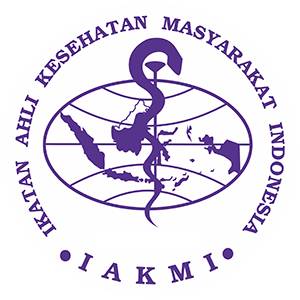PENINGKATAN PENGETAHUAN PENDEWASAAN USIA PERKAWINAN MELALUI PEER GROUP EDUCATION PADA REMAJA DI PIK-R KAPAS CIREBON
DOI:
https://doi.org/10.30787/gemassika.v8i1.1307Keywords:
Peer Group Education, Marriage Age MaturityAbstract
Indonesia teenager’s population in 2021 has 66,893,500. The teenager’s knowledge about reproductive health is inadequate and it’s the reason for the first marriage Indonesian women age still in 19.8 years. Pusat Informasi Dan Konsultasi Remaja (PIK-R) Kapas RW 03 Kedung Mendeng, Cirebon has 165 registered members, but they have never been given education for family life preparation Marriage Age Maturity (PUP). The aim is increasing the teenager’s knowledge about family life preparation Marriage Age Maturity (PUP). The method is peer group education, with 20 participants, consisting of 5 peer educators and 15 participants. The results are the participant’s pre-test was 34 average score and the post-test was 65 average score, there was an increase on the average score in 31 or 90%. There was a significant change in teenager’s knowledge after being given peer group education for Marriage Age Maturity (PUP) with p value = 0.000 < 0.05. Teenager’s Knowledge of Marriage Age Maturity (PUP) at PIK-R Kapas Cirebon increased after attending peer group education. Teenagers at PIK-R Kapas must spread out Marriage Age Maturity (PUP) information to the others using this method
References
Atunde et.al (2022) ‘Parental Involvement and Peer Group Influence as Determinants of Students Scholastic Achievement: A Survey of Kwara-North Senatorial District Public Secondary Schools, Nigeria’, The Indonesian Journal of Social Studies, 6(2), pp. 87–106.3
BKKBN (2014) Pedoman Pengelolaan Pusat Informasi dan Konsling Remaja dan Mahasiswa. Jakarta: BKKBN.
BKKBN (2019) Rencanakan Masa Depanmu. Jakarta.
BPS (2022) Statistik Indonesia Tahun 2022. Jakarta: Badan Pusat Statistik.
Cahyaningrum, L. (2022) ‘Pengaruh Peer Group Education Terhadap Pencegahan Perilaku Seks Bebas Pada Siswa SMP Negeri 16 Semarang Pencegahan Perilaku Seks Bebas Pada Siswa SMP’.
Carvalho, A. & C. S. (2022) ‘Developing peer mentor’s collaborative and metacognitive skills with a technology-enhanced peer learning program.’, Computers and Education Open, 3. doi: https://doi.org/10.1016/j.caeo.2021.100070.
Diananda, A. (2018) ‘Psikologi remaja dan Permasalahannya’, ISTIGHNA, 1(1). doi: https://doi.org/10.33853/istighna.v1i1.20.
Finlay, JE, Özaltin, E, & C. (2011) ‘The Association of Maternal Age With Infant Mortality, Child Anthropometric Failure, Diarrhoea And Anaemia For First Births: Evidence From 55 Low-And Middle-Income Countries’, BMJ open, 1(2). doi: http://dx.doi.org/10.1136/bmjopen-2011-000226.
Hull, TH, Hasmi, E, & Widyantoro, N. (2004) ‘Peer educator initiatives for adolescent reproductive health projects in Indonesia, Reproductive health matters’, An international journal on sexual and reproductive health and rights, 12(23), pp. 29–29. doi: https://doi.org/10.1016/S0968-8080(04)23120-2.
Ibrahim, M., Putra Pamungkas, L. and Purnama, H. (2022) ‘The Effectiveness of Peer Group Facilitators in Changing Teenagers’ Attitudes Towards Bullying’, KnE Life Sciences, 2022, pp. 520–531. doi: 10.18502/kls.v7i2.10350.
Kemenkes, R. (2009) Undang-Undang RI Nomor 52 tahun 2009 tentang Perkembangan Kependudukan Keluarga. Jakarta: Kemenkes RI.
Kemenkes, RI. (2014) Peraturan Pemerintah Nomor 61 Tahun 2014 Tentang Kesehatan Reproduksi, Hukor Kemenkes RI. Jakarta: Kemenkes RI. Available at: http://hukor.kemkes.go.id/uploads/produk_hukum/PP No. 61 Th 2014 ttg Kesehatan Reproduksi.pdf.
Kim, C. R., & Free, C. (2008). Recent evaluations of the peer led approach in adolescent sexual health education: A systematic review. Perspectives on sexual and reproductive health, 40 (3), 144-151.
Reynaldi & Ibrahim (2021) ‘Peran Pemuda Dalam Pembangunan Desa’, Tasnim Journal for Community Service, 2(1), pp. 29–37. doi: https://doi.org/10.55748/tasnim.v2i1.57.
Rohmana, O, & Rochayati, A, S. (2022) ‘Peer Group Education Prevention of Covid-19 Transmission on Adolescents in Sitopeng Cirebon’, Jurnal Keperawatan Respati Yogyakarta, 9(2). doi: http://dx.doi.org/10.35842/jkry.v9i2.661.
Sibarani, ER, Riyadi A, & Lestari, W. (2018) ‘Edukasi Melalui Peer Grup berpengaruh Terhadap Pengetahuan Dan Sikap Tentang Personal Hygiene’, Jurnal Media Kesehatan, 11(2). Available at: https://jurnal.poltekkes-kemenkes-bengkulu.ac.id/index.php/jmk/article/download/365/236.
Topping, K. (2022) ‘Peer education and peer Counselling for health and well-being: a review of reviews’, International Journal of Environmental Research and Public Health, 19(10), p. 6064. doi: https://doi.org/10.3390/ijerph19106064.
Wehner, S. K. et al. (2022) ‘Peer mentors’ role in school-based health promotion: qualitative findings from the Young & Active study’, Health Promotion International, 37(2). doi: 10.1093/heapro/daab089.
Wibowo, B. (2022) ‘Efektivitas Promosi Kesehatan Cuci Tangan Oleh Peer Group Terhadap Pelaksanaan Perilaku Hidup Bersih Dan Sehat Di Pesantren Imam Syafi’i Kota Bima’, Professional Health Journal, 3(2), pp. 303–315. doi: https://doi.org/10.54832/phj.v3i2.423.
Downloads
Published
How to Cite
Issue
Section
License
Copyright (c) 2024 GEMASSIKA: Jurnal Pengabdian Kepada Masyarakat

This work is licensed under a Creative Commons Attribution-NonCommercial 4.0 International License.












